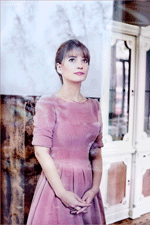> [Archived] Interviews

Interview with the Piano Player Alina Azario
At the moment, Alina Azario is a student in the class of the famous piano player Evgeni Koroliov, at Hochschule für Musik und Theater in Hamburg (Germany) in the «Konzertexamen» cycle (doctoral programme), after being conferred the Master's degree with Honours, at the same university in 2010. Since October 2010, she has taught didactics as a piano professor at Hochschule für Musik Hamburg.
In January 2011, she recorded the soundtrack of the movie Poulet aux Prunes (A persan love story) by Marjane Satrapi and Vincent Paronnaud, along with Renaud Capuçon and Berlin Score Orchestra.
Up until now, she has been invited to perform in various music festivals, including Piano aux Jacobins (Toulouse, France), Schleswig-Holstein Musik Festival (Germany), Kneipp-Musik-Festival (Germany), Les harmonies (France), Festival de Mayanne (France), Constantin Silvestri Festival (Romania), Piano fortissimo (France). She has played with highly respected conductors, such as Ovidiu Bãlan, Dietmar Graf (Germany), David Marcian, Janko Zsolt, Ovidiu Marinescu (U.S.A.) and Emily Freeman Brown (U.S.A.) and she often performs with the 'Oltenia' State Philarmonic Orchestra of Craiova, the State Philarmonic Orchestra of Sibiu and the Vidin State Philarmonic Orchestra (Bulgaria). She has made radio recordings for a number of broadcasting stations, including Deutschlandradio Kultur andNorddeutscher Rundfunk (NDR).
Alina Lazario, this evening in Paris, in the Byzantine Hall, you will be delighting the audience with some of your remarkable performances, especially with the opera you love so much. What does this evening's programme hold for us?
First of all, I want to thank you for inviting me. This evening's concert consists of the classical repertoire that I have recently recorded for my first album therefore there will be Claude Debussy and Jean Philippe Rameau. I will play French music within the concert in Paris, as well.
Which pieces in particular?
The suite in A by Jean Philippe Rameau and Préludes (Book 2) by Debussy. I will not be performing the entire programme because it would be too long, but I have put together a shorter and more intense mix for the public. I hope the concert will be a success.
There will not only be a recital, but also the release of this album , which the Romanian listeners have already had the opportunity to hear on the Radio Romania Music frequencies. Was it difficult to complete this album?
I think that every recording is somewhat difficult. I don't believe there is a musician that records an album without a deep process of dissection of the songs and intense study, the 3 or maybe 3 or 4 days, for those who have the opportunity to record for a longer period of time. Those particular days are obviously extremely intense and sometimes even difficult. A musician is never satisfied by the result when he is recording. Those 3 days of recording were in fact more interesting to me than, I dare say, three months of hard work on the instrument. There is something very interesting about recording songs.
Why are Jean Philippe Rameau and Claude Debussy reunited on the same disc?
On this disc, I wanted to reverberate in some way the great influence that baroque music exerted on Debussy's art. Debussy was a big admirer of Jean Philippe Rameau and in these Préludes, in Book 2, which was finished in 1913, there are many elements, even elements of dance that appear in Rameau's suite and also elements of his own composition, that appeal to baroque music, especially to Jean Philippe Rameau's music. So, I wanted to somehow mirror French baroque music through impressionist music.
Alina Azario, what's next for you after this Parisian stop-over?
For the next period, I have concerts in Portugal and Berlin in April and then I return to Bucharest in May, because I have a concert at the French Institute and chamber concerts in the summer. I have plenty of new music to learn and the event that keeps me busy these days, especially now, is the preparation for this year's 'Clara Haskil' International Festival in Sibiu, set between 29th august and 7th September. This is new for me as I was the one who started this classical music festival in Sibiu, in Romania and I hope the event will be just as I have imagined it, namely, a great festival with great artists coming from abroad and a series of 7 or 8 concerts taking place. I am very content because I also received support from the City Hall of Sibiu to complete this project and at the moment we're still searching for a few more sponsors to help us kick-start this project and create something truly beautiful.
Translated by Maria Lucescu and Elena Daniela Radu
MTTLC, The University of Bucharest














